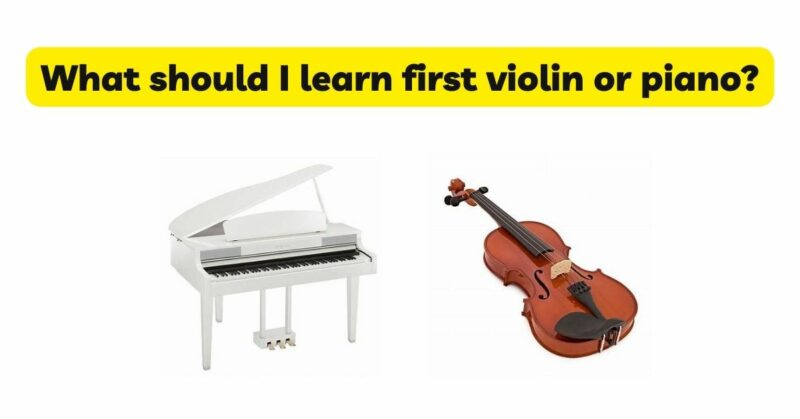Learning to play a musical instrument is a rewarding and enriching experience that can bring immense joy to one’s life. If you’ve decided to embark on this musical journey, you might find yourself torn between two popular choices: the violin and the piano. Both instruments have their unique characteristics and challenges, making the decision of which one to learn first a crucial one. In this article, we will explore various factors to consider when choosing between the violin and piano, helping you make an informed decision based on your personal preferences, goals, and circumstances.
- Consider Your Musical Goals: When choosing between the violin and piano, it is important to consider your long-term musical goals. Are you more inclined towards classical music, or do you prefer contemporary styles? The violin is well-known for its rich history in classical music, with a vast repertoire of classical pieces available. On the other hand, the piano offers versatility, allowing you to explore various genres such as jazz, pop, and classical. Assessing your musical interests and goals will provide valuable insights into which instrument aligns better with your aspirations.
- Instrument Characteristics: Understanding the unique characteristics of the violin and piano is crucial in making an informed decision. The violin is a string instrument that requires precise finger placement and bowing techniques to produce sound. It offers the opportunity to develop a strong sense of pitch and expressiveness through bow control. On the contrary, the piano is a keyboard instrument that involves pressing keys to create sound. It offers a visual representation of music theory and harmony, providing a solid foundation for understanding music. Consider the physicality and technical aspects of each instrument to determine which appeals to you more.
- Practicality and Accessibility: Practicality and accessibility are important factors to consider when choosing an instrument to learn. The piano is a relatively large instrument that requires a dedicated space in your home. It may not be easily transportable, limiting your practice options. In contrast, the violin is smaller and portable, allowing you to practice anywhere. However, the violin has a steeper learning curve due to its technical demands, which may require regular lessons and guidance. Assess your living arrangements, time availability, and access to resources to determine which instrument is more practical for your situation.
- Physical Considerations: Physical considerations should not be overlooked when choosing an instrument. Playing the violin requires holding the instrument under your chin and supporting it with your shoulder, while maintaining the correct posture. This can cause physical strain and discomfort, especially for individuals with existing neck or shoulder issues. Conversely, playing the piano involves sitting in an ergonomic position and using both hands independently. Consider any physical limitations or preferences you may have, as it can greatly impact your comfort and enjoyment during practice sessions.
- Availability of Instruction: Access to quality instruction plays a significant role in your learning journey. Evaluate the availability of qualified teachers and resources for both the violin and piano in your area. Consider factors such as the cost of lessons, availability of group classes, and the reputation of music schools. Research local music communities, online platforms, and educational resources to determine which instrument has better learning support available to you. It is essential to have access to knowledgeable mentors and learning materials to progress effectively.
- Personal Preferences: Ultimately, your personal preferences should guide your decision-making process. Reflect on the sounds that resonate with you the most and the instrument’s aesthetics that inspire you. Attend live performances or listen to recordings of both violin and piano music to gauge your emotional connection. You may also consider the cultural and historical significance associated with each instrument, as that can influence your motivation and passion for learning. Remember that your commitment and enthusiasm for the instrument you choose will greatly impact your progress and enjoyment.
Conclusion: Deciding between learning the violin or piano first is a personal choice that depends on various factors. Consider your musical goals, instrument characteristics, practicality, physical considerations, availability of instruction, and personal preferences when making this decision. Both instruments offer unique challenges and rewards, and regardless of which one you choose to learn first, the journey of mastering an instrument will be filled with joy, dedication, and personal growth. Embrace the instrument that resonates with your heart and dive into the world of music with enthusiasm and determination.


